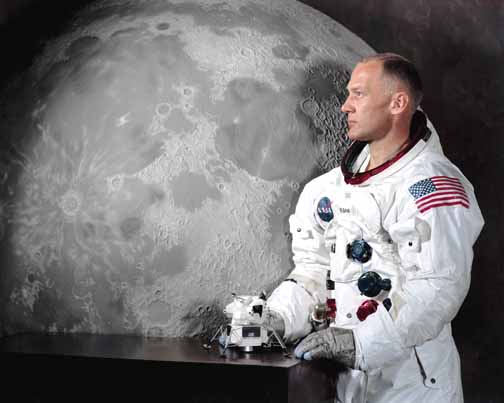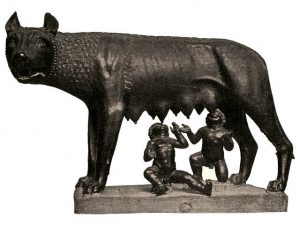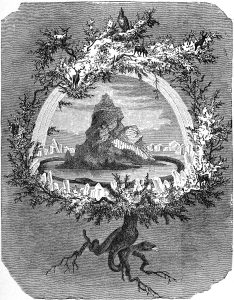July 20, 1969—a day that would go down in history, as the first humans went on to set foot on the Moon. With an estimated 530 million people worldwide watching at the time, today’s generation can recall their parents or grandparents describe the chills they felt as Neil Armstrong spoke his famous words.1 People today tend to forget that there was a second man to touch down some fifteen minutes after Armstrong: Edwin “Buzz” Aldrin, a man sometimes forgotten simply because he was not the first man on the Moon, on a mission that could have been quite capably another NASA tragedy.
The Apollo 11 Mission consisted of a crew of three men; Apollo 11 Commander Neil Armstrong, Command Module Pilot Michael Collins, and Lunar Module Pilot Edwin “Buzz” Armstrong.2 On July 16, 1969, the crew prepared to launch from Cape Kennedy in Florida. Aldrin described what he saw, as his colleagues were being strapped into the rocket. He took in the moment and the magnitude of the journey the crew was about to embark on:

“As far as I could see there were people and cars lining the beaches and highways. The surf was just beginning to rise out of an azure-blue ocean. I could see the massiveness of the Saturn V rocket below and the magnificent precision of Apollo above. I savored the wait and marked the minutes in my mind as something I would always want to remember.”3
At 9:32 a.m. on July 16, 1969, the Saturn V Rocket ignited, launching the crew of Apollo 11 towards the Moon some 238,900 miles away. Aldrin poetically describes his view of Earth from space, “The thought reoccurred that wars are generally fought for territory or are disputes over borders; from space the arbitrary borders established on Earth cannot be seen.”4
On July 20, with the ever growing Moon in sight, the Lunar Module detached from the Command Module. From here on out, Aldrin was the pilot. It was his turn to etch his name in the history of humankind.
While advancing toward the Moon’s surface, the dreaded yellow caution light came on. Being so far away from Earth, yet so close to the surface of the Moon, the astronauts’ only hope was that the malfunction wasn’t critical. “Hearts shot up into throats while we waited to learn what would happen.”5 The crew received another caution warning before being told by their flight commander back in Houston to proceed. Following the first two warnings, Aldrin and Armstrong went on to receive at least three more warnings before being reassured, once again, that the mission was still a go.
July 20, 1969 at 4:17 p.m. — Edwin “Buzz” Aldrin successfully lands Lunar Module Eagle on the surface of the Moon in Mare Tranquillitatis (The Sea of Tranquility). Command Center has been painfully waiting four long days to hear Aldrin radio the words of success: “Houston, Tranquility Base here. The Eagle has landed.”6

Edwin “Buzz” Aldrin became the second man to set a pair of footprints on the surface of the Moon some fifteen minutes after his Command Leader Neil Armstrong initially touched down. When asked about the Moon’s scenery, Aldrin described it as “Beautiful, beautiful. Magnificent Desolation.”7 The crew spent the following hours taking samples from the Moon, taking photos, and of course, planting the American Flag on the Moon’s surface.
Twenty-one hours after landing, it was time to head back to Earth. The Eagle would meet back up with the Command Module Columbia and its pilot Michael Collins in the Moon’s orbit. The crew shared a brief celebratory moment before preparing their return voyage—back towards Earth’s orbit. The crew would return to Earth eight days after launch, landing in the Pacific Ocean on July 24, 1969.8 In a stunning display of American science Buzz Armstrong, along with the rest of the Apollo 11 crew, ultimately ended the Space Race—heeding President John F Kennedy’s 1961 call to put American men on the Moon and safely return them before the decade’s end.

“And, therefore, as we set sail we ask God’s blessing on the most hazardous and dangerous and greatest adventure on which man has ever embarked.” — John F. Kennedy, September 12, 1962
- Sarah Loff, “Apollo 11 Mission Overview,” NASA, April 17, 2015. http://www.nasa.gov/mission_pages/apollo/missions/apollo11.html. ↵
- Lawrence W. Baker, Sarah Hermsen, Rob Nagel, Peggi Saari, Space Exploration Reference Library (Detriot; UXL, 2008), 178. ↵
- Edgar M. Cortright, Apollo Expeditions to the Moon: The NASA History (Courier Corporation, 2012), 204. ↵
- Edgar M. Cortright, Apollo Expeditions to the Moon: The NASA History (Courier Corporation, 2012), 206. ↵
- Edgar M. Cortright, Apollo Expeditions to the Moon: The NASA History (Courier Corporation, 2012), 212. ↵
- NASA Content Administrator, “July 20, 1969: One Giant Leap For Mankind.” NASA, February 19, 2015, http://www.nasa.gov/mission_pages/apollo/apollo11.html. ↵
- Buzz Aldrin and Wayne Warga, Return to Earth (Open Road Media, 2015), ebook. ↵
- Buzz Aldrin and Wayne Warga, Return to Earth (Open Road Media, 2015), ebook. ↵



97 comments
Engelbert Madrid
I think the Apollo 11 Mission was one of the greatest accomplishments of the United States. The Americans that were watching the astronauts land on the moon must have been amazed and astonished to look at something unbelievable at the time. I enjoyed reading this article, because it’s also important to recognize other astronauts that were in the Apollo 11 Mission, which ended the Space Race.
Pamela Callahan
I can’t imagine what it must have been like to be in space for eight days! It must have been both exhilarating and terrifying at the same time. It is truly amazing that science has allowed us to come this far that we are able to explore new worlds and travel where we have never gone before. I find it mind-boggling how much of our world has yet to be explored and it is truly amazing that now we have even more to learn in the future.
Christopher Hohman
Nice article. The men on the Apollo 11 mission did quite an incredible thing by landing on the moon. It should be mentioned that Armstrong was not the only one to touch down on the moon that day, I am glad that this story is about Aldrin too. Still I feel bad for the third man who was in orbit around the moon the whole time. I wonder if he ever got the chance to touch the surface of the moon. I certainly hope that he did. I also really liked what Aldrin said about seeing Earth from space. There are no borders from space we are all on the planet together, and we need to figure out how to get along
Kaitlyn Killebrew
I wish there were more articles like this, not to down play Buzz Aldrin, but more stories about the names not as common. I had never even heard of him until this article. It’s sad that just because he was the second man on the moon, fifteen minutes after Armstrong, that he along with Michael Collins didn’t get as much recognition. I wish there was a little bit more explanation on the twenty-one hours on the moon before they had to take off again.
Angel Torres
Its unfortunate that Neil Armstrong gets named as the first person to ever set foot on the moon. The relationship between Armstrong and Aldrin can be described as a hero and a sidekick. I really enjoyed the article because it placed a spotlight on Aldrin and highlighted his efforts put into the mission. The quotes that describe what the astronomers were seeing really give the article depth. Overall, well written and definitely captures that surreal feeling of seeing Earth from outer space.
Harashang Gajjar
I keep trying to tell you all go search out on Google and find the From the Earth to the Moon episodes. They dealt with this and how Buzz Aldrin didn’t like the idea of Armstrong being first because Armstrong wasn’t as religious as he was and he wanted to be first so he could say something about religion and God and all that. It is really a very interesting episode. He was very upset that Armstrong was going to be first out of the ship, but because of the design and how it would be difficult for Aldrin to get out with his suit on it just wasn’t feasible.
Luis Magana
I really felt the excitement and tension when I was reading this article. Buzz Aldarin was a big factor in Apollo 11. This put an end to the race against the Soviet Union because they landed on the moon. No one really hears about Aldarin because Neil Armstrong is known for being the first man to step on the moon. The article was very interesting and well written. I also really like the images used to portray your article.
Daniela Cardona
It’s sad that Buzz Aldrin does not get as much attention as he deserves, but also understandable. With all the anticipation leading up to the event I’m sure after seeing Armstrong’s first steps everyone celebrated and then broke away from the TV. I think this article does Buzz a lot of justice though, by bringing him in to the spotlight. What is important is that he knows how amazing his feat was and that he is still one of a select few to be on the moon.
Rylie Kieny
I enjoyed how this article was short and to the point. It tells the story of a man who often times is forgotten. I feel stupid now thinking that Armstrong was the only man who landed on the moon that day. How did I not know that would be an impossible task for one man. Im glad the author picked the person less known and shared his story. Buzz deserves to be just as recognized as Neil because together they accomplished something great for America and its people. Landing on the moon was a great victory for all.
William Rittenhouse
This was an amazing feet in the history of flight and space exploration. It might not be a while until we make another major breakthrough like this again. It’s cool how you wrote it on Buzz and not Neil because Neil was technically the first human who stepped foot on the moon. Buzz was a key player in this journey and helped this mission be successful. Now were here almost 50 years later and we still haven’t achieved anything as great as that since then.